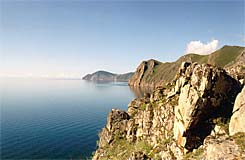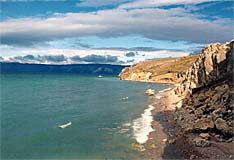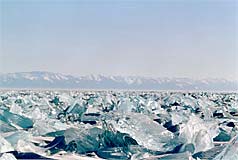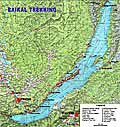Lake Baikal is between 51 29-N and 55 46-N latitude and 103 41-E and 109 57-E longitude. It is about 636 km long and 80 km wide. There are thirty rocky islands on the lake, the largest island is called Olkhon (130 km
2).
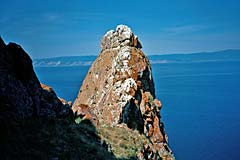 |
Sagan-Huschin |
Compared with the other great lakes of the world Lake Baikal is enormous. Baikal's volume (23,600 km
3) is greater than any other freshwater lake and makes up approximately 20 percent of the world's freshwater resources. As a point of comparison, if you were to drain Lake Baikal, it would take all the Great Lakes of United States, Superior, Michigan, Huron, Erie and Ontario to refill the empty basin.
At 1.637 meters, nearly a mile deep, it is without doubt the world's deepest lake. The surface area of Lake Baikal is about 31.000 km
2 – more than the territory of modern Belgium. Of the 336 rivers and streams flowing into Baikal, only one, Angara, flows out from it.
The creation of Lake Baikal began following the geological cataclysm during the Earth's development. Thermal energy below the surface produced movements, shifting the earth both horizontally and vertically and producing faults and rifts. These movements created the system of mountainous ridges and deep valleys extending from the North to the East and carved the lake's deep stone basin. Over thousands of years, the basin was filled by water from rain, rivers and streams.
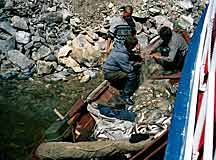 |
Fischer in Tschwyrkui |
Many have said that Lake Baikal is one of the clearest and purest-looking bodies of water in the world. Three factors, the depth of the lake, its huge volume of water and its geographical position permit Baikal's somewhat unusual process of self-purification which produce the lake's unbelievably clear water. In fact this can cause some problems with people who are afraid of heights. Those susceptible to vertigo can be unnerved when they are able to see fifty metres downward while peeking over the side of a boat. Besides being exceptionally clear Baikal's water is long famous for its spiritual and medicinal qualities. They even call it "Living water".
Many animals live in the taiga surrounding the lake, including brown bear, elk, moos and deer. Brown bears, "Lords of the Taiga" are found throughout the region and can be spotted along the shoreline.
Lake Baikal is home to the world's only freshwater seal, and the mystery how the nerpa came to Baikal still baffles scientists.
There are many kinds of fish living in the lake like sturgeon, grayling, omul, oilfish, pike, perch, burbot and others.
But still the most surprising thing about Lake Baikal is its unique and wild beauty. You'll surely see it yourself if you come here.
